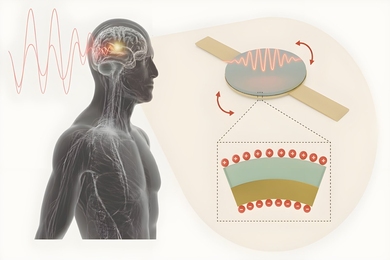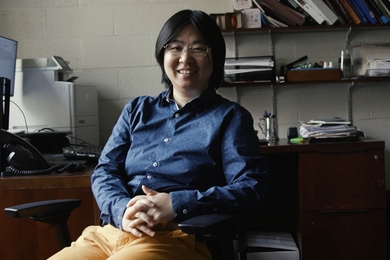Anne Mayes ’86, a materials science and engineering professor who established a fellowship for students after leaving the Institute for health reasons in 2006, died on Tuesday, Jan. 25. She was 46.
Mayes, the first woman to rise from assistant professor to tenured professor in the Department of Materials Science and Engineering (DSME), had battled breast cancer since 1994. When three surgeries and intense chemotherapy failed to cure the disease, she underwent a clinical trial in 1997 that eradicated the disease but left her immune system susceptible and with her lung capacity slowly degenerating.
She ultimately left the Institute in 2006 because of her illness, but made sure to leave something behind.
With almost $300,000 in available funds in her discretionary account, and with additional funds from the provost's office, the dean of the School of Engineering's office and community members' donations, Mayes formed a fellowship, which the department named in her honor and which Mayes called "a wonderful way to be remembered." The fellowship currently supports one student each year.
"I wished to leave the funds to the department to spend in any way they were most needed," Mayes told the MIT News Office in 2008, adding that she hoped the fellowship would aid in "attracting the very best students to our graduate program."
Mayes was a polymer expert, and her research at MIT focused on lithium polymer batteries and the role of polymers in environmental issues. One of her major developments was “baroplastics,” a plastic that becomes soft under pressure, which allowed for recycling with less energy and without degradation.
However, Mayes' focus was always on students, and in 2001 she was named a MacVicar faculty fellow — an honor given for outstanding undergraduate teaching, mentoring and educational innovation.
"She was fiercely dedicated to MIT students, not only to her advisees and UROPs, but also to the students in her classroom and to all the Course III majors," said DMSE Head Edwin "Ned" Thomas. "This dedication led her to head up the drive to introduce biomaterials to the curriculum and to redesign the laboratory subjects to be the types of subjects that she would have wanted to take as a student."
Plans are underway for a memorial service at MIT in the spring.
Mayes, the first woman to rise from assistant professor to tenured professor in the Department of Materials Science and Engineering (DSME), had battled breast cancer since 1994. When three surgeries and intense chemotherapy failed to cure the disease, she underwent a clinical trial in 1997 that eradicated the disease but left her immune system susceptible and with her lung capacity slowly degenerating.
She ultimately left the Institute in 2006 because of her illness, but made sure to leave something behind.
With almost $300,000 in available funds in her discretionary account, and with additional funds from the provost's office, the dean of the School of Engineering's office and community members' donations, Mayes formed a fellowship, which the department named in her honor and which Mayes called "a wonderful way to be remembered." The fellowship currently supports one student each year.
"I wished to leave the funds to the department to spend in any way they were most needed," Mayes told the MIT News Office in 2008, adding that she hoped the fellowship would aid in "attracting the very best students to our graduate program."
Mayes was a polymer expert, and her research at MIT focused on lithium polymer batteries and the role of polymers in environmental issues. One of her major developments was “baroplastics,” a plastic that becomes soft under pressure, which allowed for recycling with less energy and without degradation.
However, Mayes' focus was always on students, and in 2001 she was named a MacVicar faculty fellow — an honor given for outstanding undergraduate teaching, mentoring and educational innovation.
"She was fiercely dedicated to MIT students, not only to her advisees and UROPs, but also to the students in her classroom and to all the Course III majors," said DMSE Head Edwin "Ned" Thomas. "This dedication led her to head up the drive to introduce biomaterials to the curriculum and to redesign the laboratory subjects to be the types of subjects that she would have wanted to take as a student."
Plans are underway for a memorial service at MIT in the spring.






